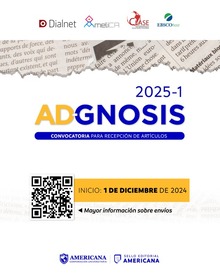The force field around a culture of simplicity and empathy: management from people governance
DOI:
https://doi.org/10.21803/adgnosis.10.10.473Keywords:
Empathy, Simplicity, Strategy, MasteryAbstract
In a complex, volatile and ever-changing world, there
are challenges for management. changing, there are
challenges for the Administration, the Organizations and
for the Management. The main challenge challenge is
evidenced in the depletion of an administrative paradigm
paradigm based on traditional schemes under an
excessively analytical an excessively analytical, excessively
functional and excessively scientific rationality. It is
necessary, therefore, to and validate new paths towards a
more pertinent, coherent and capable of more relevant,
coherent and capable of dealing with complexity without
increasing it, in order to improve business performance
of the companies. In this order of ideas, simplicity and
empathy emerge as two opportunities for intervention in
companies, based on their organizational cultures.
Downloads
References
Balmes Jaume (1860), Filosofía Fundamental. Barcelona, imprenta del diario de Barcelona
Eisenberg, N., Fabes, R.A., Guthrie, I.K.y Reiser, M. (2000). Dispositional emotionality and regulation: their role in predicting quality of social functioning. Journal of Personality and Social Psychology, 78, 136-157.
Bórquez Tepezano, B. ., González Espinoza, M. .,& Muñoz del Real, G. . (2020). Análisis sobre la percepción de la calidad y la relación con el desempeño del capital humano. Revista ADGNOSIS, 9(9), 11–19. https://doi.org/10.21803/adgnosis.9.9.433
Gore Ernesto, (2012): El próximo Management: Acción, práctica y aprendizaje. Editorial Management.
Hoffman, M.L. (1987). La aportación de la empatía a la justicia y al juicio moral. En N. Eisenberg y J. Strayer (Eds.), La empatía y su desarrollo (págs. 59-93). Bilbao: Desclée de Brouwer, 1992
Hoffman, M.L. (1991). Commentary. Human Development, 34, 105-110.
Ken Segall Revista Harvard Deusto Marketing y Ventas, pg. 112.
Lewin, Kurt, (2011) “Field Theory in Social Science”. Harper & Row, New York.
Mestre Escrivá V., Frías Navarro M. D. y Samper García P. (2004): “La medida de la empatía: análisis del Interpersonal Reactivity Index”. Universidad de Valencia. En: Psicothema 2004. Vol. 16, nº 2, pp. 255-260
Moya-Álbiol L., Herrero, M. y Bernal MC.: “Bases Neuronales de la Empatía”. En: Revista de Neurología 2010; 50: 89-100.
Reyes Ramírez, E. M. (2017). La corrupción en el Estado Colombiano. Dictamen Libre, (21), 29–36. https://doi.org/10.18041/2619-4244/dl.21.3140
Robledo. F, Juan., Del Rio Jorge, Martinez Omaira, Ruiz Jose (2015). Gestion del Conocimiento Organizacional: Fundamentos Teóricos. Editorial Jorale y Editorial Universidad Autónoma de Baja California, P.197
Downloads
Published
Versions
- 2021-12-01 (2)
- 2021-12-01 (1)
Issue
Section
License
Copyright (c) 2021 ADGNOSIS

This work is licensed under a Creative Commons Attribution-NonCommercial-NoDerivatives 4.0 International License.






